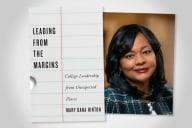You have /5 articles left.
Sign up for a free account or log in.
Kentucky governor Matt Bevin has proposed that some 70 small programs in the state budget be completely eliminated -- as he also has proposed across-the-board cuts of around 6 percent for public higher education and most other state functions.
Bevin, a Republican, has cited tight state budgets and has not spoken on specific programs he would eliminate. But word spread this weekend that one of his targets was the University Press of Kentucky, and many authors and scholars have reacted with alarm.
While the press is based at the University of Kentucky, it is not affiliated with that institution alone. Rather, it works with all the state's public universities as well as a number of private colleges, include Bellarmine University and Berea and Centre Colleges. The press publishes more than 50 books a year and is considered particularly strong in scholarship on the state, in Civil War and other military history, and in volumes that relate to the history and culture of Appalachia.
In a sign that the press punches above its weight and of its track record in publishing up-and-coming authors, its books have won 12 Frederick Jackson Turner awards, a prize given for the best first book by an author in American history.
Expressions of support are coming in from scholars who live far away from Kentucky, but have come to rely on the press. For example, this testimonial comes from a Stanford University professor.
University presses, of course, matter in higher education beyond scholars who are published by the presses or those who read their books. In many disciplines, publishing a book or two with a scholarly press is a key requirement for tenure. So any shrinkage in potential outlets can have an impact on many academics' careers.
Like most university presses, the University Press of Kentucky relies on university support (in this case through the state) for only some of its expenses, and uses book sales as another revenue source. The Lexington Herald-Leader reported that the state covers all employee salaries ($672,000 for 16 employees) while book sales cover all other expenses. Officials have said that the press could not function without the state support.
John Thelin, a professor at the University of Kentucky who studies the history of higher education and public policy, is a member of the faculty advisory committee of the Kentucky press, and he has also served as part of the peer-review process of considering book submissions.
There is "no logic" to removing state funds from the press, Thelin said, adding that "the books are critically acclaimed" and the operations are "very frugal."
Thelin said he was particularly disappointed in the governor's proposal because the press "serves the entire state."
Peter Berkery, executive director of the Association of University Presses, said via email that the association was following the situation in Kentucky with concern.
"At first blush the governor’s proposal seems both shortsighted in its policy and conspicuous in its granularity," Berkery said. "The University Press of Kentucky is such a prominent and prestigious member not only of our community, but also of the communities it serves throughout the commonwealth; why anyone would want to eliminate an award-winning curator of their own culture and history is baffling."








